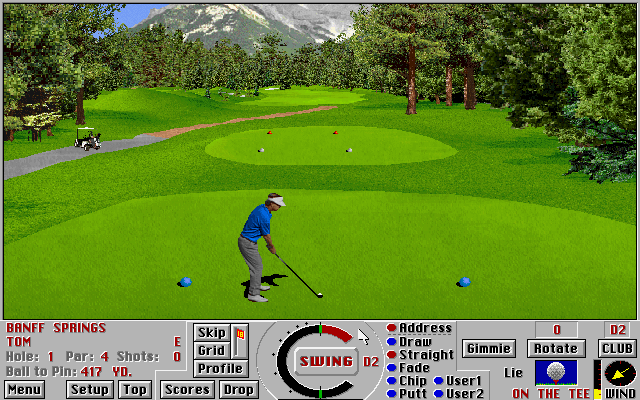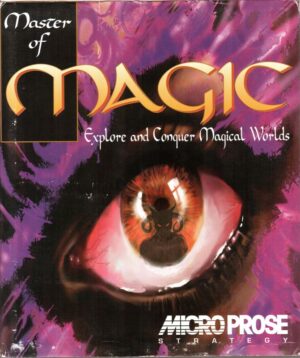Retro Replay Review
Gameplay
As an add-on to Links, Links 386 Pro or Microsoft Golf, Banff Springs seamlessly integrates with the series’ tried-and-true swing mechanics. From the first tee, you’ll notice how the game engine handles elevation changes and wind variations along the Bow River valley. The familiar three-click swing meter remains intuitive, but the undulating fairways and strategically placed bunkers demand precision beyond what many original courses required. Mistimed swings or misjudged club choices often find your ball nestled in deep traps, echoing the reputation of Banff Springs as a course that punishes inaccuracy.
(HEY YOU!! We hope you enjoy! We try not to run ads. So basically, this is a very expensive hobby running this site. Please consider joining us for updates, forums, and more. Network w/ us to make some cash or friends while retro gaming, and you can win some free retro games for posting. Okay, carry on 👍)
Hole layouts on both the Sulphur Nine and the Rundle Nine offer a satisfying variety of challenges. Tight doglegs force you to consider an aggressive approach shot or play conservatively to the safe side of the fairway. Par-3s like “The Devil’s Cauldron,” perched above its emerald lake, test your ability to control trajectory and backspin, while long par-5s reward well-executed draws that carry the river’s edge. The simulated wind direction indicator is particularly useful here, allowing golfers to gauge whether to bail out or go for glory.
The course difficulty scales nicely if you tweak player handicap settings. Beginners will appreciate forgiving rough margins on early holes, while seasoned veterans can crank up pin placements to the back of fast greens. The classic Links caddy advice pops up with club and yardage suggestions, tying into the course’s real-world stats: 6,643 yards from the championship tees with a par 71 setup. As an add-on, Banff retains the same performance footprint, so load times and frame rates mirror those of the base game.
Graphics
Banff Springs shines as one of the more visually striking expansions for its era. The rolling fairways are rendered in lush VGA palettes that capture the deep greens of Alberta’s valleys. Distant snow-capped peaks—Sulphur Mountain, Rundle, and Tunnel Mountain—create a dramatic backdrop, and the river’s gentle curves are traced in reflective blue water textures. On par-3s you may even spot a dab of emerald on “The Devil’s Cauldron,” a tiny, jewel-toned pond that stands out against the snowy ridges.
Greenside bunkers are detailed with high-contrast sand textures that make them immediate visual hazards. Fairway undulations are accentuated by shading that clearly shows slopes, allowing you to read putts more easily. Despite the limitations of 1990s hardware, the use of dithering and layered bitmaps gives a sense of depth on approach shots. Trees and shrubbery along the rough edges add realism, though their polygon count is modest by today’s standards.
Dynamic skyboxes shift from bright midday sunshine to overcast afternoons, subtly affecting how shadows fall across each hole. Cloud patterns drift behind mountain ranges, lending an atmospheric authenticity that keeps each round feeling fresh. The occasional rippling water effect in the Bow River is a nice touch, evoking the real course’s proximity to rushing alpine waters. Overall, Banff’s visuals hold up well within the Links engine, showcasing some of the best environmental artistry available at the time.
Story
While golf simulations aren’t known for dramatic narratives, Banff Springs carries historical weight that enriches every round. Designed in 1928 by Stanley Thompson—one of the world’s foremost golf architects—the course weaves a tale of early 20th-century course design in the Canadian Rockies. The digital recreation leans on archival photos and course blueprints, honoring Thompson’s original vision of rolling fairways and natural bunkering.
The Sulphur Nine and Rundle Nine each have their own character, reflecting how Thompson used the local terrain to craft strategic shot opportunities. Banff’s ranking as a silver medal course by Golf Magazine reinforces its storied reputation, and the in-game hole descriptions touch on these accolades, giving you a sense of playing living history. Each time you tee off, there’s an undercurrent of tradition—knowing you’re traversing the same slopes that hosted amateur and professional events for nearly a century.
Memorable moments abound—the rise of the tee box on Hole 16, “Devil’s Cauldron,” feels almost cinematic as you peer down at the isolated green. These architectural flourishes, combined with the real-world lore of Alpine golf retreats, give the expansion a narrative arc rarely matched in pure course add-ons. In this way, Banff Springs tells its story more through landform and layout than any cutscene or textual exposition.
Overall Experience
Links: Championship Course – Banff Springs stands out as a premium add-on that extends the lifespan of your base golf simulator. It offers an ideal mix of challenge and aesthetic appeal, making each round memorable. Installation is straightforward: load the course files alongside your existing Links or Microsoft Golf directory, and you’re ready to play. In less than five minutes you can be teeing off beneath towering peaks.
For avid Links players, Banff Springs feels like the missing crown jewel—a course that tests every facet of your game, from tee-to-green strategy to green-reading finesse. The balance of par-3 precision, par-4 accuracy and par-5 shotmaking ensures no two holes feel alike. Replay value is high, as altering tee positions or wind settings can drastically change your decision-making process.
Whether you’re chasing low scores in tournament mode or simply soaking in the digital splendor of the Canadian Rockies, Banff Springs delivers a complete package. Its harmonious blend of gameplay depth, graphical charm and historical context makes it a must-have for any Links or Microsoft Golf enthusiast. This expansion reaffirms why course add-ons remain such a vital part of the Links legacy.
 Retro Replay Retro Replay gaming reviews, news, emulation, geek stuff and more!
Retro Replay Retro Replay gaming reviews, news, emulation, geek stuff and more!









Reviews
There are no reviews yet.